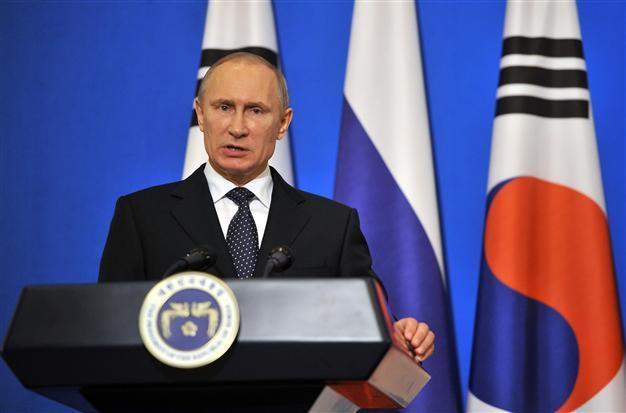Putin in Seoul pushes new 'Silk Road' via North Korea
SEOUL - Agence France-Presse

Russian President Vladimir Putin speaks during a joint news conference at the presidential Blue House in Seoul November 13, 2013. REUTERS photo
Russian President Vladimir Putin was in South Korea Wednesday, pushing a pet project for a new trading route linking Asia and Europe by rail that requires prying open North Korea.The ambitious scheme envisages an "Iron Silk Road" uniting the rail networks of South and North Korea and connecting them to Europe via the Trans-Siberian Railway.
But it faces huge political obstacles, given the volatility of inter-Korean relations and the international community's struggle to contain the North's nuclear ambitions through UN sanctions.
Speaking to a South Korea-Russia business conference during his one-day visit, Putin acknowledged the difficulties but said they were outweighed by the project's potential advantages.
"I hope political problems will be solved at an early date, as South Korea, North Korea and Russia will reap great economic benefits when it's completed," Putin said, urging South Korean investors to come on board.
"This project, if accomplished, will help make a great contribution to the establishment of peace and stability on the Korean peninsula," he added Russia took a first step in September, when it completed a 54-kilometre (33-mile) track from its southeast border town of Khasan to the North Korean port of Rajin.
Located in the far northeast, where the borders of North Korea, Russia and China converge, Rajin offers a warm-water port for the North's two giant neighbours.
Putin wants to see the rail link extended through North Korea, across the world's last Cold War frontier, and all the way down to the southern South Korean port of Busan.
Media reports say Russia is looking for South Korea to take a 34 percent share in the project, with Moscow holding 36 percent and Pyongyang 30 percent.
Steelmaker Posco, train operator Korail and Hyundai Rotem have been suggested as possible members of a consortium to take on the South Korean share.
Putin's visit saw the two sides sign a memorandum of understanding in support of the project, but Andrei Lankov, a Russian expert on North Korea who teaches at Seoul's Kookmin University, said he remained "very sceptical" about the entire undertaking.
"The idea itself makes perfect sense from a trade and economic viewpoint," Lankov told AFP.
"But this is clearly going to cost billions of dollars and what companies are going to risk that much investment with North Korea in the current climate?" "I'm sure North Korea will be keen, because once it got started, it would provide Pyongyang with a new project to manipulate and use to pressure others," he added.
Lankov said the same financial and political risks applied to plans to build a pipeline to supply both Koreas with Russian natural gas.
Observers highlight the precedent of the Kaesong industrial zone jointly run by North and South Korea, which Pyongyang unilaterally shut down in April as military tensions surged.
The zone reopened in September, but South Korean factory owners said they lost a small fortune during the five-month closure.
Both the rail and gas projects were brought up in Putin's talks with South Korean President Park Geun-Hye.
The two leaders also discussed North Korea's nuclear weapons programme amid signs that Pyongyang, despite UN sanctions, is moving ahead on all fronts to acquire a credible nuclear deterrent.
Russia is a member of the stalled six-party talks on North Korea's nuclear programme, along with China, the United States, Japan and the two Koreas.
China and North Korea have been pushing to get the dialogue back on track and Putin told a joint press conference with Park that Moscow also favoured an "early resumption" of the talks.
Seoul and Washington insist Pyongyang must first show some genuine commitment to denuclearisation.
















